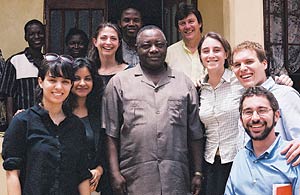 |
| Law School students (left to right) Sara Shapouri, Varda Hussain, Brooke Purcell, Jenn DeLeonardo, Arthur Koski-Karrel, and Chris Dunn. Koidu Senior District Officer S. B. Kamara is in the center. |
Welcome to Koidu
Student-Run
Human Rights Study Project Travels to Sierra Leone
• Jennifer DeLeonardo ’05
As the deafening whir and flying dust of the United Nations helicopter receded, six UVA law students were left to explore the major diamond-mining district in Sierra Leone. A hotspot of the decade long civil war, Koidu was the focal point for much of the illegal trade in “blood diamonds.” Driving through town, one of the most riveting sights was the roofs. There were only two varieties—brand new and shining in the sunlight or non-existent gaping holes. The “simple” explanation was provided offhandedly by the head of the Peace Diamond Alliance, an organization sponsored by the United States Agency for International Development—the rebels had burned or otherwise destroyed every roof in the entire town during the civil war. As the District Officer of the region discussed the reconstitution of the local police force, it was hard to put aside his opening comments on being spared his life by the lucky chance that one of the rebels assigned to kill him was a former student who had enjoyed his schoolroom lessons. Watching hundreds of laborers dig and sift through dirt and clay for diamonds in the hot midday sun for their pay of two cups of rice a day, sitting in a rural courtroom watching cases being processed by barely trained legal assistants awaiting the monthly visit of a rotating judge, a U.S. law student had to reassess what justice really means in a country ravaged by a brutal civil war and abysmal poverty.
For ten days in March, members of the UVA Law Human Rights Study Project (HRSP) ventured far from the comfort of Mr. Jefferson’s University to study transitional justice and human rights norms in post-conflict Sierra Leone, the home of a unique form of hybrid international criminal tribunal, the UN Special Court for Sierra Leone. To understand the meaning and functioning of justice in a post-conflict society, the group interviewed a wide variety of individuals, including the Chief Justice of the Supreme Court of Sierra Leone, the U.S. Ambassador, the Prosecutor of the UN Special Court, a major diamond dealer, the District Officer of the diamond mining district of Kono, the head of the Pakistani Peacekeeping Battalion, a member of Parliament, UN officials, Sierra Leonean and international staff at over 20 NGOs, and a few random mercenaries.
Founded by Michael Royal ’04 in 2002, HRSP is fully run and organized by students and recently became an official non-profit organization. The Project functions as a hybrid between a student organization and an independent study project. After initial research and discussion, each year’s team chooses an overarching theme and region or country of focus. Each individual then selects a more finite research topic within that framework. Frequent group meetings and consultation with professors and outside experts allow students to work collaboratively while pursuing areas of independent interest. This year’s team—third years Christopher Dunn and Varda Hussain and second-years Jennifer DeLeonardo, Brooke Purcell, Sara Shapouri, and Arthur Koski-Karell—soon found that taking concepts learned in classrooms and academic articles and looking intensely at how those legal frameworks interact with real people in a real place leads to valuable, deep, and often heated debate amongst group members.
Despite months of pre-trip planning, nothing could prepare team members for what they would encounter on the ground. “Within twelve hours of landing in Freetown, we saw that well over two-thirds of the material we had read about international justice in Sierra Leone—all of which was considered academically authoritative—was either exaggerated, incomplete, or flat-out misinformed,” said Koski-Karell. “To see an entire people struggle for justice after a decade-long civil war, to sit down with the present and future leaders of a country teetering between remarkable growth or renewed tragedy, to shake the hands of the very people who are advancing the rule of international law around the world—these are the defining moments of a 21st century legal education.”
The group covered diverse research topics. Members looked at the role of prosecutorial discretion in the formation of international law, the interaction between the establishment of the Special Court and Sierra Leonean constitutional norms, the reconstitution of the Sierra Leonean army, the rehabilitation and reintegration of child soldiers, the international and local regulation of blood diamonds, and the role of the Special Court in building a national justice system.
In addition to the academic component of the trip, team members are responsible for fundraising and logistics. “Our trip could not have happened without six dedicated students. We depended on each other—to raise the funds, to make travel plans, to make contacts with people who were working in Sierra Leone,” said Purcell.
The Project is an integral part of the recent upsurge in the international law program at UVA. Along with the Human Rights Clinic run by Deena Hurwitz, an increased number of students electing to spend a summer interning abroad, greater fellowship opportunities for international work and excellent course offerings and professors, interest in international law at UVA has exploded in the past several years.
“HRSP provides an incredible opportunity for international law students to get into the field and see how the concepts and ideas they've studied in the classroom play out in the real world. It was one of my best experiences at the Law School, and represents just one of the many opportunities that sets Virginia apart from other law schools as a place to study international law,” said Dunn, the head of this year’s group. Dunn was so inspired by the experience that he chose to return to Sierra Leone this fall to work in the Office of the Prosecutor of the Special Court after receiving the Monroe Leigh Fellowship in International Law.




